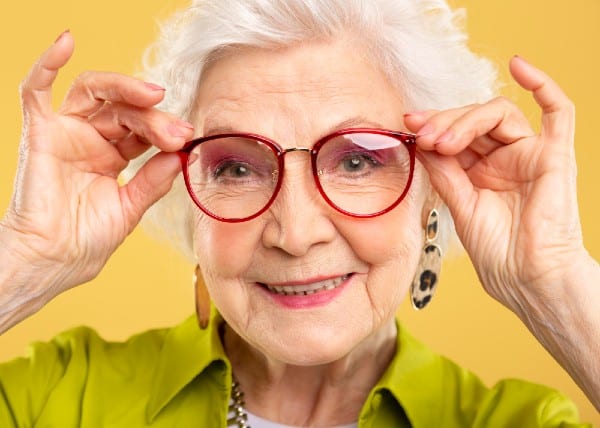Some degree of vision loss is typical with older age and it can range in severity and effects. Macular degeneration is one form of vision loss that can significantly impact daily living and independence. Understanding macular degeneration and its effects on vision can empower seniors and their caregivers to be proactive in watching out for early signs and knowing how to proceed in terms of seeking support.
What is Age-Related Macular Degeneration?
The macula, a part of the retina located at the back of the eye, is responsible for helping us see things that require precision focus for fine details. This includes tasks such as reading, recognizing faces, and driving. Age-related Macular Degeneration (AMD) is a condition that impacts the macula and is common in people over the age of 50.
Types of Age-Related Macular Degeneration (AMD)
Under the umbrella of AMD, there are two types: Dry and Wet.
Dry Macular Degeneration
The vast majority of cases of macular degeneration are of the dry variety, which involves a breakdown of the photoreceptor cells on the retina due to an accumulation of protein deposits called drusen. Components of the macula gradually become thinner, and seniors with dry macular degeneration slowly lose central vision, causing small details to become distorted and more challenging to see.
Wet Macular Degeneration
Wet macular degeneration is less common than dry, but can have more serious outcomes. It occurs when abnormal blood vessels grow in a fine layer of cells within the macula (known as the Choroid). Vision loss with wet macular degeneration can be severe, as leakage of protein and blood causes significant blurring and distortion.
In some cases, dry macular degeneration can develop into wet, so it is always essential to consult a healthcare professional to address symptoms early and ensure proper attention is paid to eye health.
Developing Macular Degeneration
People aged 60 and over are at an increased risk of developing macular degeneration. Macular degeneration also tends to run in families (at the level of immediate relatives), so knowing your parents’ or siblings’ history of vision problems and sharing that information with healthcare professionals can be important for assessing risk factors.
Symptoms of Age-Related Macular Degeneration
The initial symptoms of macular degeneration tend to be visual distortions that make things look a little wonky, such as wavy lines, blurring of details, or a dark or empty area appearing in the center of vision. It is not always easy to recognize the onset of AMD, as changes in vision tend to develop gradually.
It is incredibly important to note that macular degeneration is not associated with any pain, so seniors should always make sure that they see their doctor regularly and get routine eye checks. These checks can help detect any changes in vision early, before they become severe, and can also help monitor the progression of the condition.

Living with Macular Degeneration
Everyone’s experience with macular degeneration will be different, and the speed and ways in which the condition progresses will be specific to each person. Learning to live with macular degeneration requires some adjustments, and as the condition continues to impact the eyes, many seniors can end up with permanent vision loss or become legally blind.
Adjusting to changes in vision can be a challenge as seniors learn to navigate which things they can still easily do alone. and which things now require a bit of assistance.
Age-Related Macular Degeneration Care
Currently, there is no cure for AMD, but treatments can help to slow its progression. Speaking to a healthcare professional is crucial and can illuminate the options that might be possible to minimize vision damage, providing the necessary support and guidance.
Being open and discussing concerns and developments with family members, caregivers, and a healthcare professional is key. It can help seniors feel connected and understood, aiding in better adjustment to the new realities that accompany impaired vision.
Maintaining Eye Health
Some general lifestyle choices can help promote better eye health and prevent eye conditions such as macular degeneration.
- See the eye doctor regularly
- Protect your eyes from the sun
- Get regular exercise
- Eat well (dark leafy greens, fish, nuts, and fruit)
- Take vitamin and mineral supplements
- Manage cholesterol
- manage blood pressure
- Avoid smoking
Staying vigilant about eye care and making choices that promote healthy vision can help seniors keep their eyes healthy and functioning at optimal levels.



